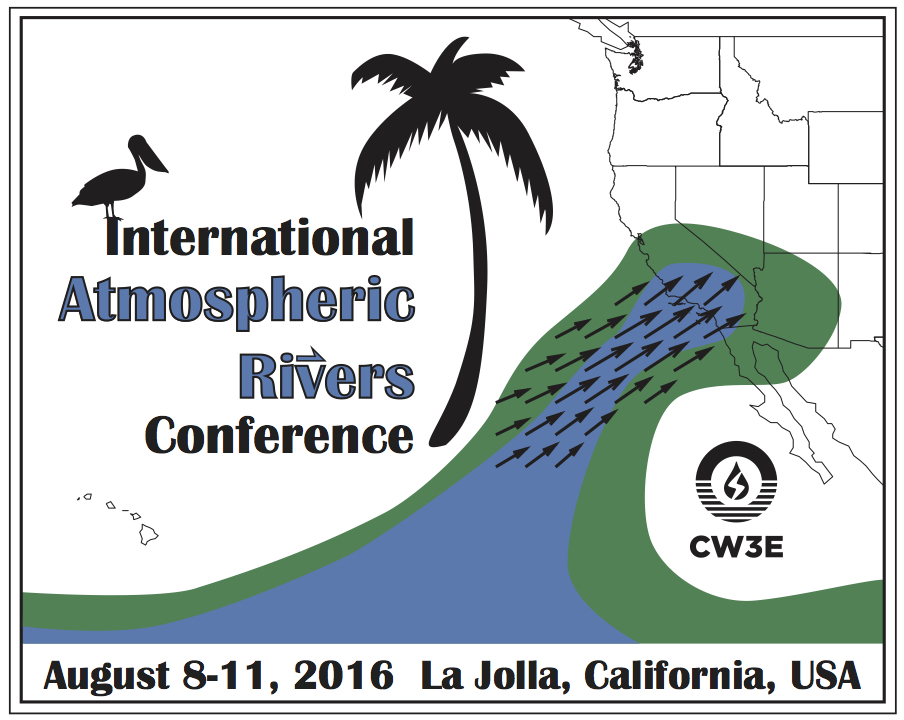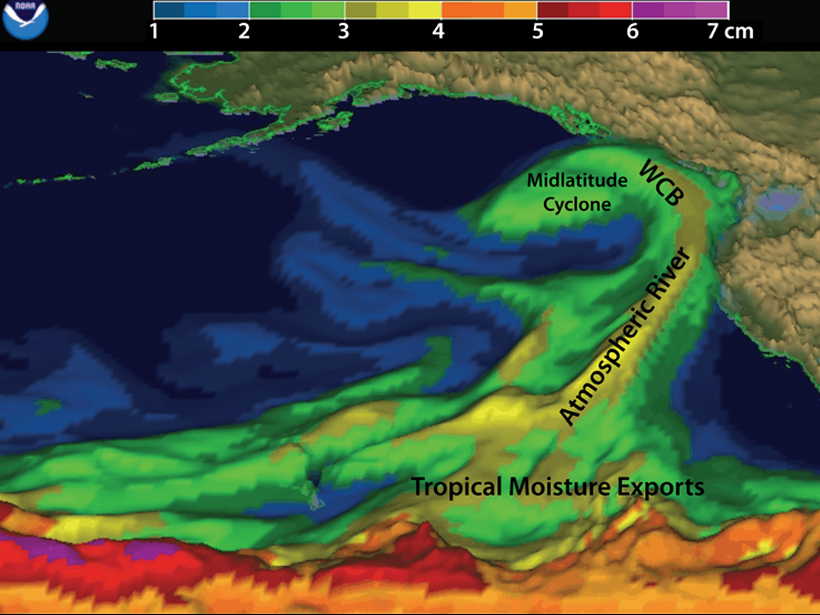| Monday, August 8, 2016 | Tuesday, August 9, 2016 | Wednesday, August 10, 2016 | Thursday, August 11, 2016 | Poster Session |
|
|
|||
|
|
|
|
|
|
|
|
|
Monday, August 8, 2016
| Welcome and Introductory Session | |||
F. Martin Ralph |
Emergence of the Concept of Atmospheric Rivers | ||
Lance Bosart |
The Contributions of Atmospheric Rivers to Extreme Weather Events Arising from the Interactions of Tropical Disturbances with Tropospheric Jet Streams | Abstract | Presentation |
Irina Gorodetskaya |
Atmospheric Rivers Impact on the East Antarctic Surface Mass Balance During Recent Years | Abstract | Presentation |
Jay Jasperse |
ARs and Lake Mendocino FIRO | Abstract | Presentation |
| Applications 1 | |||
Michael Anderson |
Observing and Detecting ARs and its Application to Water Management in California | Abstract | Presentation |
Jeanine Jones |
Atmospheric Rivers - A Potential Tool for Improving Sub-Seasonal to Seasonal Precipitation Forecasting? | Abstract | Presentation |
David Reynolds |
So it's a Land-falling Atmospheric River, Can That Help the Forecaster Make a Better QPF? | Abstract | Presentation |
Chris Smallcomb |
Communicating Forecast Atmospheric River Scenarios in the Sierra and Western Nevada | Abstract | |
Alan Fox |
Local Area Quantitative Precipitation Forecasts for Atmospheric River Events in North-central California Using the MtnRT System | Abstract | Presentation |
| Global and Regional Perspectives 1 | |||
Bin Guan |
Global Perspective of Atmospheric Rivers: Climatology, and Climate Modulation | Abstract | Presentation |
Maximiliano Viale |
The Impacts of Atmospheric Rivers on Precipitation over the West Coast of Southern South America | Abstract | Presentation |
Kyle Mattingly |
Atmospheric River Impacts on the Greenland Ice Sheet | Abstract | Presentation |
Karianne Odemark |
Extreme Precipitation in Norway and the Connection to Atmospheric Rivers | Abstract | Presentation |
James Stuart |
Atmospheric Rivers in Australia? | Abstract | Presentation |
| Breakout Session | |||
Applications and Decision Makers |
Notes | ||
Tuesday, August 9, 2016
| Applications 2 | |||
Lawrence Schick |
Managing Reservoirs for Atmospheric Rivers - The Uneven Balance of Flood Risk and Water Supply | Abstract | Presentation |
Matthew Kelsch |
Atmospheric Rivers Training from UCAR's COMET Program | Abstract | Presentation |
Dale Cox |
AR Science, Natural Hazards Risk Reduction, and ARkStorm | Abstract | Presentation |
Francina Dominguez |
The Lifecycle of an Atmospheric River - from Moisture Sources to Socioeconomic Impacts | Abstract | Presentation |
Maureen McCarthy |
Integrated Modeling of Climate Stress and Resilience in Snow-Fed Arid Lands | Abstract | Presentation |
| Modeling and Methodologies 1 | |||
Duane Waliser |
Atmospheric River Modeling: Forecasts, Climate Simulations and Climate Projections | Abstract | Presentation |
Michael DeFlorio |
Global Prediction Skill of Atmospheric Rivers: Seasonal Variability and Relationship to ENSO Phase | Abstract | Presentation |
Brian Kawzenuk |
Quantification of Atmospheric River Landfall Errors at Bodega Bay, California in the Global Forecast System and West-WRF | Abstract | Presentation |
Andrew Martin |
How do Spectrally Vast AR Thwart Attempts to Skillfully Forecast their Continental Precipitation? | Abstract | Presentation |
Ruby Leung |
Aerosol Effects on Clouds and Precipitation: Insights from CalWater 2015 and a Multi-year Quasi-global Simulation of Trans-Pacific Transport of Aerosols | Abstract | Presentation |
| Observing and Detecting ARs 1 (IOPS/Satellite) | |||
Allen White |
Monitoring Freezing Levels across California: Quantifying the Impacts of ARs and the Recent El Niño | Abstract | Presentation |
Ryan Spackman |
Integrated Observing Strategies for Atmospheric Rivers - Major Field Studies and Future Directions | Abstract | Presentation |
Lynn McMurdie |
Atmospheric Rivers Observed during the Olympic Mountains Experiment (OLYMPEX) Field Campaign | Abstract | Presentation |
Joseph Zagrodnik |
Synoptic and Orographic Control of Observed Drop Size Distribution Regimes in Atmospheric River Events During the OLYMPEX Field Campaign | Abstract | Presentation |
Ju-Mee Ryoo |
Capturing Atmospheric Rivers: Alpha Jet Atmospheric eXperiment (AJAX) Flights in Support of CalWater/El Niño Rapid Response 2016 | Abstract | Presentation |
Andrew Kren |
Impact of Global Hawk Data from the SHOUT-ENRR 2016 Field Campaign on an Atmospheric River in the Central North Pacific | Abstract | Presentation |
Wednesday, August 10, 2016
| Impacts of ARs 1 | |||
Michael Dettinger |
A Survey of the Hydrological and Ecological Effects of Landfalling Atmospheric Rivers | Abstract | Presentation |
Christine Albano |
Linking Inter-Annual Variations of Atmospheric River Landfalls to Vegetation Responses in the Southwestern United States | Abstract | Presentation |
Laurie Huning |
Investigating the Climatological Impact of Atmospheric Rivers in the Sierra Nevada (USA) Seasonal Snowpack | Abstract | Presentation |
Benjamin Hatchett |
The Contributions of Atmospheric Rivers to Avalanche Fatalities in the Western United States | Abstract | Presentation |
| Impacts of ARs 2 | |||
Alexandre Ramos |
Atmospheric Rivers in Europe: From Moisture Sources to Impacts and Future Climate Scenarios | Abstract | Presentation |
Nina Oakley |
Atmospheric Rivers as a Trigger for Post-Fire Debris Flows in the Transverse Ranges of Southern California | Abstract | Presentation |
Ivory Small |
Atmospheric Rivers and Enhanced Integrated Vapor Transport Episodes: Their Role in Damaging Frontal Passages in Southern California with an Emphasis on Strong Winds | Abstract | Presentation |
| Theory, Structure, and Processes 1 | |||
Jason Cordeira |
Mid-Latitude Dynamics and Atmospheric Rivers | Abstract | Presentation |
Tom Beucler |
A Moist Static Energy Perspective on Atmospheric Rivers | Abstract | Presentation |
Benjamin Moore |
Rossby Wave Breaking and Extreme Precipitation in the Central and Eastern U.S. | Abstract | Presentation |
Ola Persson |
Arctic Atmospheric Rivers: Triggers for Linking Atmospheric Synoptic Transport, Cloud Phase, Surface Energy Fluxes, and Sea-ice Growth | ||
Paul Neiman |
An Airborne and Ground-based Study of a Long-lived and Intense Atmospheric River with Mesoscale Frontal Waves Impacting California during CalWater-2014 | Abstract | Presentation |
Christine Shields |
Atmospheric River Tracking Method Intercomparison Project (ARTMIP) | Presentation | |
| Modeling and Methodologies 2 | |||
Ruby Leung |
Atmospheric Rivers in a Hierarchy of Climate Simulations: Resolution Sensitivity and Impacts of Global Warming | Abstract | Presentation |
Vicky Espinoza |
Projections of Climate Change Effects on Global Atmospheric River Landfalls | Abstract | Presentation |
Aneesh Subramanian |
Stochastic Multi-scale Atmospheric Modeling for Weather Forecasting: An Atmospheric River Case Study | Abstract | Presentation |
Christine Shields |
U.S. West Coast Versus the U.K. Atmospheric Rivers: Difference in Future Climate Projections | Abstract | Presentation |
| Breakout Session | |||
How we Transform a Collection of Work into a Published Monograph |
Notes | ||
Thursday, August 11, 2016
| Observing and Detecting ARs 2 (ARDT) | |||
Gary Wick |
Recent Updates to Objective Atmospheric River Detection Techniques and Resulting Implications for Atmospheric River Climatologies | Abstract | Presentation |
Jon Rutz |
The Development of an Atmospheric River Catalog at the Center for Western Weather and Water Extremes | Abstract | Presentation |
Alexander Gershunov |
Assessing the Climate-Scale Variability and Seasonal Predictability of Atmospheric Rivers Affecting the West Coast of North America | Abstract | Presentation |
Scott Sellars |
High Dimensional IVT Atmospheric River Characteristics Using "CONNected objECT (CONNECT)" Segmentation Approach: Building a Database of Atmospheric River Events | Abstract | Presentation |
Ali Behrangi |
How Well is Atmospheric River Precipitation Quantified From Space? Composite Analysis over the Western United States | Abstract | Presentation |
| Global and Regional Perspectives 2 | |||
Jon Rutz |
Factors Influencing the Inland Penetration of Atmospheric Rivers over Western North America | Abstract | Presentation |
John Gyakum |
Atmospheric Rivers Over Eastern Canada: Their Seasonality, Impact on Air Mass Dynamics, and Links to Extreme Precipitation | Abstract | Presentation |
Sean Reilly |
Influence of the Santa Cruz Mountains on Precipitation from a Landfalling Atmospheric River | Abstract | Presentation |
Michael Mueller |
Moisture Transport During the Inland-Penetrating Atmospheric River of Early November 2006 in the Pacific Northwest: A High-Resolution Model-based Study | Abstract | Presentation |
Douglas Miller |
Investigation of Atmospheric Rivers Impacting the Pigeon River Basin of the Southern Appalachian Mountains | Abstract | Presentation |
| Theory, Structure, and Processes 2 | |||
F. Martin Ralph |
Airborne and Satellite Observations of AR Structure | ||
Carolyn Reynolds |
Sensitivity of High-Impact Extratropical Cyclones to Water Vapor in Atmospheric Rivers | Abstract | Presentation |
Qianwen Luo |
The Cloud-Radiative Forcing of the Atmospheric Rivers on the U.S. Continents: an Observational Climatology Study | Abstract | Presentation |
Hari Mix |
Coordinated Sampling and Analytical Effort to Examine Interactions Between INPs and Rainout in Winter 2016 ARs in California | Abstract | Presentation |
Gino Passalacqua |
Oceanic Influence on Landfalling Atmospheric Rivers: The Intense Precipitation of February 2-3, 1998 | Abstract | Presentation |
Jesse Nusbaumer |
A Numerical Evaluation of the Sources of Moisture for Atmospheric Rivers that Impact the West Coast of the United States in the Modern Era and 2100 | Abstract | Presentation |
Poster Session
| Applications | |||
Stanley Czyzyk |
Forecasting High Impact Precipitation Events in the Lee of the Southern Sierra, Bishop, CA | Abstract | |
John Dumas |
National Weather Service Forecasters Use GPS Precipitable Water Vapor for Enhanced Situational Awareness during the Southern California Summer Monsoon | Abstract | Poster |
Lauren Muscatine |
How does a Multi-Authored Academic Book Get Published Anyway? | Abstract | Poster |
| Global and Regional Perspectives | |||
Deveshi Buch |
Atmospheric River Event over the Eastern Pacific in February 2014: Analysis and Climatological Context | Abstract | Poster |
Aaron Jacobs |
Atmospheric Rivers in Alaska - Yes they do Exist and are Usually Tied to the Biggest and Most Damaging Rain Generated Floods in Alaska | Abstract | Poster |
Anthony Liu |
Some Unique Features Associated with the June 2013 Alberta Flooding: Precipitation, Atmospheric River and Evapotranspiration | Abstract | Poster |
Benjamin Moore |
Atmospheric Rivers and Heavy Precipitation Events in the Southeastern U.S. | Abstract | |
Richard Moore |
Dynamics and Predictability of an Extreme Norwegian Precipitation Event | ||
Tairu Salami |
Variability of Climatic Elements in Nigeria over Recent 100 Years | ||
| Impacts of ARs | |||
Katie Hirschboeck |
The Role of Inland-Penetrating Atmospheric Rivers in Arizona's Heterogeneous Flood Environment | Abstract | |
Homero Paltan |
Atmospheric Rivers: Shapers of Global Surface Hydrology | ||
| Modeling and Methodologies | |||
Katerina Gonzales |
Response of North Pacific Atmospheric Rivers to Climate Change Conditions | Abstract | Poster |
Michael Murphy |
The Use of Airborne GNSS RO Profiles in Mesoscale Forecasts of an Atmospheric River Event | Abstract | Poster |
| Observing and Detecting ARs | |||
Antonia Gambacorta |
Satellite-based Thermal Sounding Capabilities During Extreme Events: Lessons Learning During CalWater and El Niño Rapid Response Campaigns | Abstract | |
Hao Liu |
Monitor Atmospheric River Initiation, Evolution and Impacts on North America from Joint Satellite Moisture, Wind Vector and Precipitation Information | Abstract | Poster |
Wenze Yang |
Global Atmospheric Rivers Depicted from Satellite and NWP Reanalysis, and their Connection to Weather and Climate Phenomenon | Abstract | Poster |
| Theory, Structure, and Processes | |||
Ju-Mee Ryoo |
Classification of Atmospheric River Events on the U.S. West Coast Using a Trajectory Model | Abstract | Poster |

